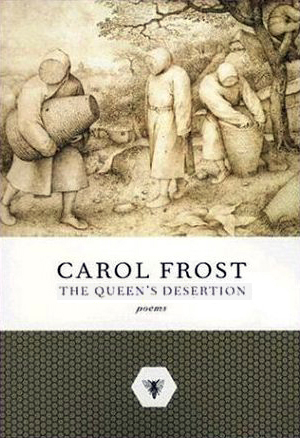Verdad Magazine Volume 10
Spring 2011, Volume 10
Interview with Poet Carol Frost
Verdad: Your collection of poetry, The Queen’s Desertion, seems an attempt to reveal the "darkness" of the unconscious mind...
Carol Frost: Are the poems dark? I suppose so, but also full of light, especially in the Voyage section ("in light's white rum, in the light of the mind" in Orchid, for instance. I bet if you counted the references to light in that section you'd be surprised, including sun and starlight). But the Lucifer poem, too, is full of light—dark and light, black and gold, charcoal and flame/in a fire, etc., etc.
V: The opening poem stands alone: is this a call to Lucifer?
CF: Lucifer speaks of the light and dark of his experience, and while Eden has failed, the "earth's garden," he says, "lives on." I like that Lucifer after all this time (present day) is compelled by earth's beauty. It's a failure and a triumph for him, don't you see.
V: The collection is structured in four sections. The title poem, "The Queen's Desertion" calls the reader's attention to the duality of mind, and perhaps to a theme of the collection: that the mind is like a hive. What else is trying to get our attention?
The poem "Apiary II" suggests the drifting of the mind through time, perhaps through a lifetime? (disease/death/aging) Could you talk about this poem a bit?
CF: Yes, the mind is sometimes a hive, certainly in the first section, which is the beginning of a series I'm working on about dementia—"the mind at its end" and "dead beauty" in "The Queen's Desertion." The presumption throughout the book is that the world is beautiful but not in some sappy way; further, I suppose is the presumption that it takes a mind—imagination and memory—to appreciate. Apiary II says, by the way, "at meadow end." So, yes, time passes, a mind regresses ("a little girl") and something like madness ensues.
V: In the poem "Telling the Bees": we see the "I" here, which is not present in many of these poems. Can you suggest why "I" is here? How are the bees related to the mind?
CF: There are I's in these first poems, certainly in Apiary IX. And there's the "I" of the demented woman in Apiary VII. I may step into "Telling the Bees" with some emotional force. In some of the other poems, I stay out of it to let the readers feel their own empathy of the person losing memory and fading away. Probably the strongest presence of the "I" in the first section is in IX. About "Telling the bees,' there's in American folklore, bees "told" of a person's death. But bees are also the mind—hers and ours.
V: "Old Pan" closes the book. The "mind" in this collection seems to have seen all it could and now must rest or cease "seeing" altogether, as winter and darkness pervade and Pan ages?
CF: Old Pan is in winter (and in mythology the keeper of bees) but, look, in 3 poems he laughs and in 5 he dances. He hears music in 6 and the mind still functions—"bees cascading."
I'd say the book is richly positive but darkness IS a part of the experience of living.
The "Voyage" section concerns a journey past three rivers like Hell's three rivers and ends when the stars come out, as the Inferno ends. Basically I like my beauty and my earth real—not sugary—maybe even by considering or traveling through hell, but back. (Nature is hungry. Beauty wants no other beauty but one, but I say there's more than one beauty. See in "Voyage these lines: "struck by light:: does the heart not darken: sins/sorrows, winters:: but here coastal light—stellar/and enamel—isn't it the light—changes everything. . . ."
So, what's the duality, now?
V: Where does your work "fit," in terms of language and lyric poetry? I see lyric at work here, but also an interesting drifting in syntax.
CF: To write the Florida poems I felt I needed a new syntax--the experience in Florida in a boat alone and surrounded by images that are not so much imagined as seen--to present the onslaught of sensory detail and the fecundity of the natural world in near tropics. So I use a lot of noun phrases, as in, OMG "billows, mullet leaping toward shore:/ also pigfish pinfish herring sheepshead silverside grass and top/minnow prawns: brown pelicans" and sharks, all manner or orchids and lists. I thought periods would stop the speed of the impressions so I decided on colons and double colons and not many commas.
V: Craft: If you were teaching this collection to your students, what aspect of craft would you point out?
CF: if I were teaching the book, I'd want to talk about crafting the line. Otherwise, it may as well be prose.
BIO: Winters for several years I visited the gulf coast of Florida, a remote nature filled part of the state; my mother was diagnosed with dementia; I moved to Florida and still am overwhelmed by the beauty of Cedar Key. I actually still spend hours alone in a boat—I fish and I marvel and I guess I think.
For more about Carol Frost and a selection of her poems, click here.
Carol Frost's latest collection of poetry, Honeycomb, is now available.

